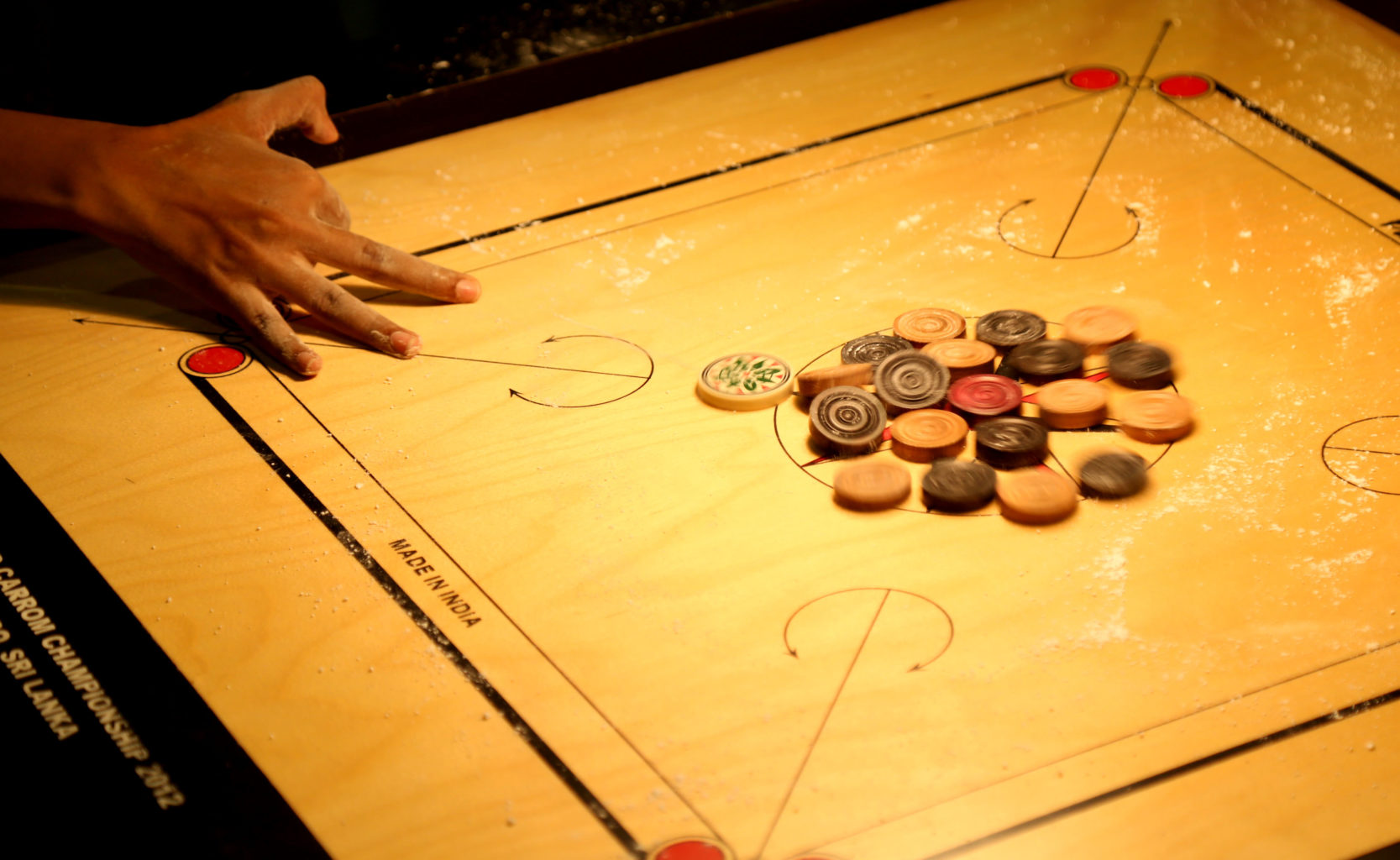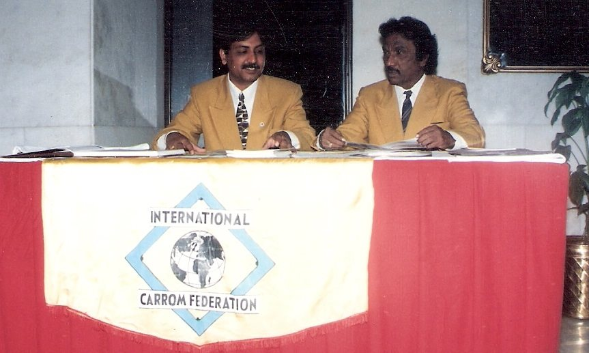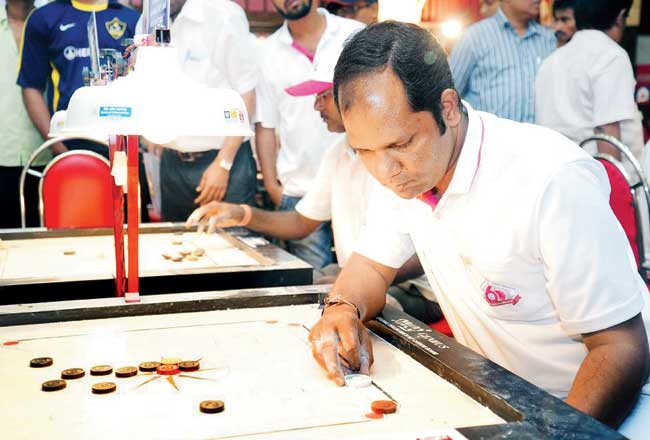Begin typing your search above and press return to search.
Featured
Only passion keeps carrom going in India

Not long ago, the distinct acoustics produced by wooden coins hitting the edge of a square board used to echo around most of the mohalla clubs across India. Taking a big sip from the hot cup of tea after deflecting a coin into one of the pockets in the board augured a sense of accomplishment for many. A game of carrom has dominated the hearts of billion Indians as their favourite amateur game after coming back from workplaces, on a lazy Sunday evening or even at home during the extended summer vacations. Be it a teenager or an octogenarian, the romanticism for carrom had inflicted into the everyday life. Much before our addiction to the smartphones and social media, our socialising would happen over a game of carrom. Debates inflated, ideas exchanged, emotions shared, and heroics unravelled every day from different sides of the board. Also read: Ultimate Frisbee : The up and coming gender neutral team sport A similar sight might seldom be seen today, but carrom has been a competitive sport for quite some time, with state and national level competitions being held like other sports in India. The game that has been passed over generations has witnessed several changes in its rules over the years. Most of us are familiar to the 29-point “board” but international rules today follow the 25-point games, where pocketing the queen or the red coin fetches three points, instead of five. Once a player or a duo carries 21 points, the queen turns valueless. A match now comprises eight games, and the winner is the one who scores 25 points first or who secures maximum points after the completion of eight games. Home shots are still a part of the game. The earlier trend of seasoned players using their safely kept ivory strikers is not seen nowadays, which has been replaced with hardened plastic strikers. As a football ground, the surface of a carrom board is also meticulously maintained by boric powder to preserve its swiftness.  Bangaru Babu (not in picture) established the International Carrom Federation (ICF) in 1988 and the Commonwealth championships. And in that very year, the formal rules for the game was also made public. Bangaru Babu's effort brought about a quick rise of carrom's popularity in states like Tamil Nadu, West Bengal, Andhra Pradesh and Maharashtra, with many youngsters including college and school going girls, taking to it. Soon competitions at district, state and national level became a regular feature, throwing up quite a few talents who could don national colours. The All India Carrom Federation (AICF) is India's national sports federation for the indigenous game of carrom, sanctioning six to seven national-level tournaments per year. It has so far conducted 96 national championships for sub-junior, junior and senior players, and has introduced cadet (under 12 years of age) and youth (under 21 years of age) national championships. Though there are many existing carrom houses across India, the game's popularity is dwindling, and in several cases, it has been associated with gambling. Many attribute this to lack of employment opportunities for talented state and national level players. Besides, the game has never attracted money in it. A sum of merely Rs 40 lakh was invested in the recently concluded national championship in Pune in the third week of May. Though the tournament saw the participation of around 800 people from all states, including players and officials, the district association had to arrange sponsors, MP and MLA funds, central and state aid, and also bring out souvenirs which fetched money from advertisements. Incidentally, India can boast of housing the world carrom champion, 37-year-old Yogesh Pradeshi. But we hardly get to know about him owing to the lack of popularity of the game, which fails to earn a broadcast value.
Bangaru Babu (not in picture) established the International Carrom Federation (ICF) in 1988 and the Commonwealth championships. And in that very year, the formal rules for the game was also made public. Bangaru Babu's effort brought about a quick rise of carrom's popularity in states like Tamil Nadu, West Bengal, Andhra Pradesh and Maharashtra, with many youngsters including college and school going girls, taking to it. Soon competitions at district, state and national level became a regular feature, throwing up quite a few talents who could don national colours. The All India Carrom Federation (AICF) is India's national sports federation for the indigenous game of carrom, sanctioning six to seven national-level tournaments per year. It has so far conducted 96 national championships for sub-junior, junior and senior players, and has introduced cadet (under 12 years of age) and youth (under 21 years of age) national championships. Though there are many existing carrom houses across India, the game's popularity is dwindling, and in several cases, it has been associated with gambling. Many attribute this to lack of employment opportunities for talented state and national level players. Besides, the game has never attracted money in it. A sum of merely Rs 40 lakh was invested in the recently concluded national championship in Pune in the third week of May. Though the tournament saw the participation of around 800 people from all states, including players and officials, the district association had to arrange sponsors, MP and MLA funds, central and state aid, and also bring out souvenirs which fetched money from advertisements. Incidentally, India can boast of housing the world carrom champion, 37-year-old Yogesh Pradeshi. But we hardly get to know about him owing to the lack of popularity of the game, which fails to earn a broadcast value.  India can boast of housing the world carrom champion, 37-year-old Yogesh Pradeshi. (Image: Mid-Day) A winner at the prestigious world carrom championships and two world cups, Pradeshi, who once found it difficult to meet ends, now holds a managerial position with the Indian Oil Corporation solely because of his playing skills. He also opines the Governments should encourage the sports by bestowing it with funds. The Maharashtra government in 2016, provided Rs 70 lakh each to three state players who shone in the Birmingham world championship held that year. Ilavazhaki, one of the most talented female carrom players in India, has bagged over 111 international gold medals. Ilavazhaki, who harbours a dream of having an Indian Carrom League, set up the World Carrom Champion Academy in 2016. Located in Thiruvallur district, around 40 kms from Chennai, over the past two years, she has trained 60 students for free. Some of her students S Ganesan, A Sagayabarathi, R Gayathri have won national tournaments. Organizers across the world want this sport to be recognised by the International Olympic Committee. However, such developments remain to be a distant dream. Afterall, it is purely the passion for this game that keeps it going. India has witnessed the rise of its sporting league culture in the recent history, with the government as well as private sponsors or corporates coming forward to encourage sports like kabaddi, football and badminton. Carrom, which is still played by billions across the world might receive a facelift if a similar approach is taken to bring the sports into the mainstream, that too from India. Clearing the board in one go (pocketing all the coins on the board – white or black - keeping the strike) is by all mean a hard-earned achievement like scalping a hat-trick in cricket or a hat-trick of goals in football. But carrom, being an entertaining yet not a being an audience pulling sports, misses out on chance in this age of IPL and other variants of opulent leagues.
India can boast of housing the world carrom champion, 37-year-old Yogesh Pradeshi. (Image: Mid-Day) A winner at the prestigious world carrom championships and two world cups, Pradeshi, who once found it difficult to meet ends, now holds a managerial position with the Indian Oil Corporation solely because of his playing skills. He also opines the Governments should encourage the sports by bestowing it with funds. The Maharashtra government in 2016, provided Rs 70 lakh each to three state players who shone in the Birmingham world championship held that year. Ilavazhaki, one of the most talented female carrom players in India, has bagged over 111 international gold medals. Ilavazhaki, who harbours a dream of having an Indian Carrom League, set up the World Carrom Champion Academy in 2016. Located in Thiruvallur district, around 40 kms from Chennai, over the past two years, she has trained 60 students for free. Some of her students S Ganesan, A Sagayabarathi, R Gayathri have won national tournaments. Organizers across the world want this sport to be recognised by the International Olympic Committee. However, such developments remain to be a distant dream. Afterall, it is purely the passion for this game that keeps it going. India has witnessed the rise of its sporting league culture in the recent history, with the government as well as private sponsors or corporates coming forward to encourage sports like kabaddi, football and badminton. Carrom, which is still played by billions across the world might receive a facelift if a similar approach is taken to bring the sports into the mainstream, that too from India. Clearing the board in one go (pocketing all the coins on the board – white or black - keeping the strike) is by all mean a hard-earned achievement like scalping a hat-trick in cricket or a hat-trick of goals in football. But carrom, being an entertaining yet not a being an audience pulling sports, misses out on chance in this age of IPL and other variants of opulent leagues.
Also read: ‘Is it football or cricket?’: Captain of India’s Leg Cricket team decodes the sport
The origin of carrom has not been appropriately traced.
Many believe that this game is of Indian or Sri Lankan origin. Going by history, a player by the name Bangaru Babu, who settled in Chennai, single-handedly propagated the sport at international level too, even in countries like Germany. He established the International Carrom Federation (ICF) in 1988 and the Commonwealth championships. Bangaru Babu (not in picture) established the International Carrom Federation (ICF) in 1988 and the Commonwealth championships. And in that very year, the formal rules for the game was also made public. Bangaru Babu's effort brought about a quick rise of carrom's popularity in states like Tamil Nadu, West Bengal, Andhra Pradesh and Maharashtra, with many youngsters including college and school going girls, taking to it. Soon competitions at district, state and national level became a regular feature, throwing up quite a few talents who could don national colours. The All India Carrom Federation (AICF) is India's national sports federation for the indigenous game of carrom, sanctioning six to seven national-level tournaments per year. It has so far conducted 96 national championships for sub-junior, junior and senior players, and has introduced cadet (under 12 years of age) and youth (under 21 years of age) national championships. Though there are many existing carrom houses across India, the game's popularity is dwindling, and in several cases, it has been associated with gambling. Many attribute this to lack of employment opportunities for talented state and national level players. Besides, the game has never attracted money in it. A sum of merely Rs 40 lakh was invested in the recently concluded national championship in Pune in the third week of May. Though the tournament saw the participation of around 800 people from all states, including players and officials, the district association had to arrange sponsors, MP and MLA funds, central and state aid, and also bring out souvenirs which fetched money from advertisements. Incidentally, India can boast of housing the world carrom champion, 37-year-old Yogesh Pradeshi. But we hardly get to know about him owing to the lack of popularity of the game, which fails to earn a broadcast value.
Bangaru Babu (not in picture) established the International Carrom Federation (ICF) in 1988 and the Commonwealth championships. And in that very year, the formal rules for the game was also made public. Bangaru Babu's effort brought about a quick rise of carrom's popularity in states like Tamil Nadu, West Bengal, Andhra Pradesh and Maharashtra, with many youngsters including college and school going girls, taking to it. Soon competitions at district, state and national level became a regular feature, throwing up quite a few talents who could don national colours. The All India Carrom Federation (AICF) is India's national sports federation for the indigenous game of carrom, sanctioning six to seven national-level tournaments per year. It has so far conducted 96 national championships for sub-junior, junior and senior players, and has introduced cadet (under 12 years of age) and youth (under 21 years of age) national championships. Though there are many existing carrom houses across India, the game's popularity is dwindling, and in several cases, it has been associated with gambling. Many attribute this to lack of employment opportunities for talented state and national level players. Besides, the game has never attracted money in it. A sum of merely Rs 40 lakh was invested in the recently concluded national championship in Pune in the third week of May. Though the tournament saw the participation of around 800 people from all states, including players and officials, the district association had to arrange sponsors, MP and MLA funds, central and state aid, and also bring out souvenirs which fetched money from advertisements. Incidentally, India can boast of housing the world carrom champion, 37-year-old Yogesh Pradeshi. But we hardly get to know about him owing to the lack of popularity of the game, which fails to earn a broadcast value.  India can boast of housing the world carrom champion, 37-year-old Yogesh Pradeshi. (Image: Mid-Day) A winner at the prestigious world carrom championships and two world cups, Pradeshi, who once found it difficult to meet ends, now holds a managerial position with the Indian Oil Corporation solely because of his playing skills. He also opines the Governments should encourage the sports by bestowing it with funds. The Maharashtra government in 2016, provided Rs 70 lakh each to three state players who shone in the Birmingham world championship held that year. Ilavazhaki, one of the most talented female carrom players in India, has bagged over 111 international gold medals. Ilavazhaki, who harbours a dream of having an Indian Carrom League, set up the World Carrom Champion Academy in 2016. Located in Thiruvallur district, around 40 kms from Chennai, over the past two years, she has trained 60 students for free. Some of her students S Ganesan, A Sagayabarathi, R Gayathri have won national tournaments. Organizers across the world want this sport to be recognised by the International Olympic Committee. However, such developments remain to be a distant dream. Afterall, it is purely the passion for this game that keeps it going. India has witnessed the rise of its sporting league culture in the recent history, with the government as well as private sponsors or corporates coming forward to encourage sports like kabaddi, football and badminton. Carrom, which is still played by billions across the world might receive a facelift if a similar approach is taken to bring the sports into the mainstream, that too from India. Clearing the board in one go (pocketing all the coins on the board – white or black - keeping the strike) is by all mean a hard-earned achievement like scalping a hat-trick in cricket or a hat-trick of goals in football. But carrom, being an entertaining yet not a being an audience pulling sports, misses out on chance in this age of IPL and other variants of opulent leagues.
India can boast of housing the world carrom champion, 37-year-old Yogesh Pradeshi. (Image: Mid-Day) A winner at the prestigious world carrom championships and two world cups, Pradeshi, who once found it difficult to meet ends, now holds a managerial position with the Indian Oil Corporation solely because of his playing skills. He also opines the Governments should encourage the sports by bestowing it with funds. The Maharashtra government in 2016, provided Rs 70 lakh each to three state players who shone in the Birmingham world championship held that year. Ilavazhaki, one of the most talented female carrom players in India, has bagged over 111 international gold medals. Ilavazhaki, who harbours a dream of having an Indian Carrom League, set up the World Carrom Champion Academy in 2016. Located in Thiruvallur district, around 40 kms from Chennai, over the past two years, she has trained 60 students for free. Some of her students S Ganesan, A Sagayabarathi, R Gayathri have won national tournaments. Organizers across the world want this sport to be recognised by the International Olympic Committee. However, such developments remain to be a distant dream. Afterall, it is purely the passion for this game that keeps it going. India has witnessed the rise of its sporting league culture in the recent history, with the government as well as private sponsors or corporates coming forward to encourage sports like kabaddi, football and badminton. Carrom, which is still played by billions across the world might receive a facelift if a similar approach is taken to bring the sports into the mainstream, that too from India. Clearing the board in one go (pocketing all the coins on the board – white or black - keeping the strike) is by all mean a hard-earned achievement like scalping a hat-trick in cricket or a hat-trick of goals in football. But carrom, being an entertaining yet not a being an audience pulling sports, misses out on chance in this age of IPL and other variants of opulent leagues. Also read: ‘Is it football or cricket?’: Captain of India’s Leg Cricket team decodes the sport
Next Story






